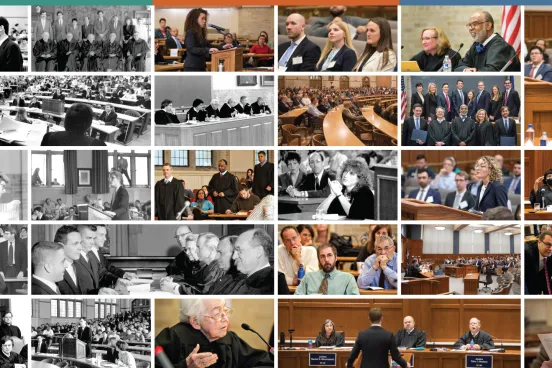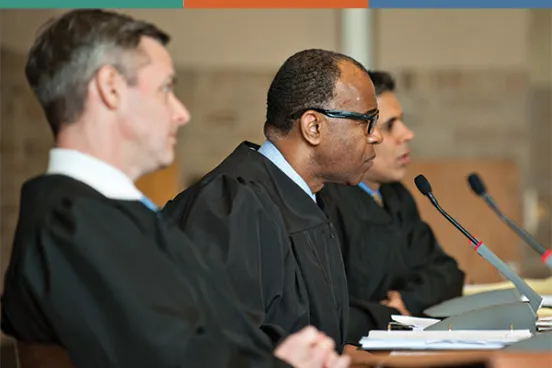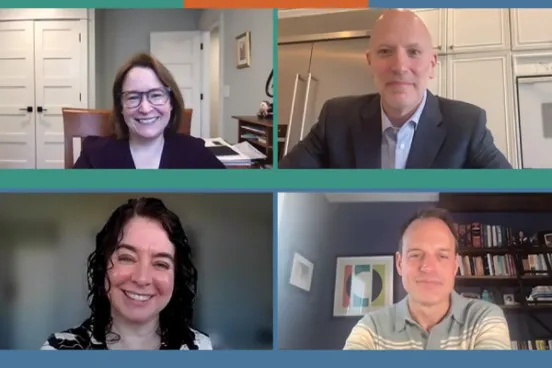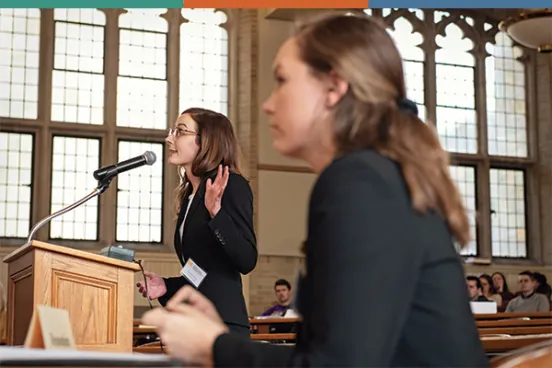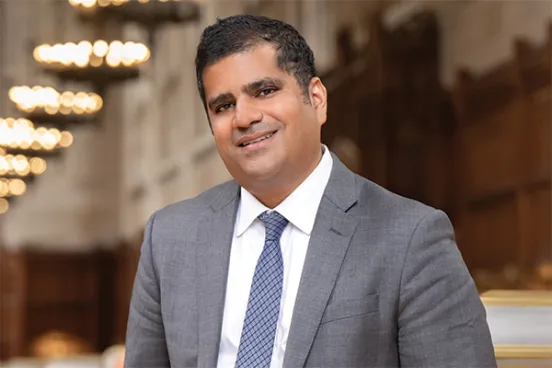When the Law School’s first moot court convened in 1925–1926, students argued a case that has since been lost to the mists of time. The earliest record that still exists is dated April 20, 1928, and includes a one-page final argument centered on the hypothetical case of Smith v. Jones. Very much of its time, the case involved a plaintiff who had fought in World War I and property he had conveyed to his fiancée, who later died of tuberculosis.
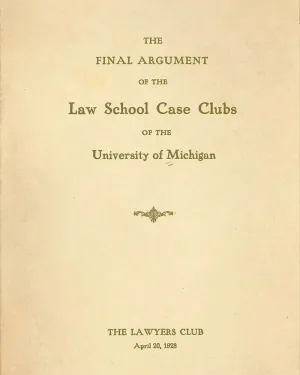
In the subsequent decades, hypothetical cases have involved a variety of topics, often reflecting current legal issues of the day. The 2024–2025 case explored whether an eviction moratorium that was enacted following a devastating wildfire violated the takings or contracts clauses to the US Constitution. Members of the Campbell Moot Court Board, the student organization that oversees the competition, wrote the case with support from faculty and the competition’s adviser, the Hon. Joan Larsen of the US Court of Appeals for the Sixth Circuit.
Unlike law schools that use actual cases for their moot courts or outsource the writing to a law firm, members of the student board work each summer to develop the hypothetical case in time for distribution at the beginning of the fall term. This is a change from the earliest years of the competition, when faculty wrote the cases, and provides an additional learning opportunity for students. Students also may be eligible to receive academic credit for their work in crafting the Campbell case.
“It's really hard to write a hypothetical problem that’s going to capture all the legal issues and hang together factually and procedurally,” says Larsen. “The students research and write a problem that has to be realistic and simulate a real Supreme Court case. They also write a bench memo for the judges to use throughout the rounds.”
Over the century of the competition, the complexity of the case and associated work to participate received the occasional push back. Consider the announcement of the 1974–1975 competition in the September 13, 1974, issue of the Law School’s Res Gestae newsletter. One sentence all but shouted at students that the research workload would be reasonable:
“Professor Westen, in response to a request that the scope of the problem be narrowed substantially from past years, has followed Supreme Court procedure and certified four questions for resolution by the Court. While the work involved in preparing and arguing the brief will be substantial, IT IS ANTICIPATED THAT THE RESEARCH NECESSARY TO ADEQUATELY DEAL WITH THE ISSUE WILL BE SUBSTANTIALLY LESS THAN HAS BEEN REQUIRED IN PAST YEARS.”
Whether written by faculty or students, Campbell cases have almost always taken current issues in state or federal courts into account.
“Looking back at the cases that were argued, they usually dealt with issues of the day that were matters of general interest,” says Theodore St. Antoine, ’54, the James E. and Sarah A. Degan Professor Emeritus of Law and Law School dean from 1971 to 1978. St. Antoine and his competition partner, Donn Miller, ’54, won the 1953 Campbell moot by arguing an antitrust case that involved the broadcast of sporting events. “That kind of relevance made it more exciting for everybody concerned.”

Campbell Questions Through the Years
Campbell moot courts have examined a variety of topics over the decades—as this sampling from Law School yearbooks, newsletters, and moot court documents shows.
1937: Case Club Final Argument
“The Associated Press and twelve member newspapers bring this suit in equity, to enjoin the Ann Arbor radio station from broadcasting news items abstracted from the newspapers published on the streets in Ann Arbor, Adrian, and nearby towns. The Associated Press claims that this news is obtained at great expense; that the radio station shares none of this expense; and that such action of the radio station constitutes unfair competition which should be enjoined. Furthermore, the Associated Press claims it has a property right in the news as published. The radio station denies that plaintiff has a property right in the news, and denies that the broadcasting from newspapers amounts to unfair competition.”
1977: The Codicil
“The traditional Henry M. Campbell Moot Court Competition underwent significant alterations this year under co-director Mike Herbert. Seniors were allowed into the competition and the problem proved to be a precursor of a major Supreme Court reverse discrimination case, [Regents of the University of California v. Bakke].”
1990: The Quadrangle
“This year’s topic involved the removal of a tube supplying food and water to a woman in a permanent coma-like state. Half of the teams represented the woman’s family, arguing that the woman had a right to refuse medical treatment. The remainder of the teams represented the hospital, likening removal of food and water to euthanasia.”
2004: Res Gestae
“The case concerned the constitutionality of the Defense of Marriage Act (DOMA) under the Full Faith and Credit and Fifth Amendment Due Process Clauses of the U.S. Constitution. Sanders and Page represented the petitioner, an individual seeking to recover a money judgment based on a tort action. Gabriel and Lorenz represented the respondent, a corporation seeking protection from the judgment under DOMA, which contains a provision stating that no state shall be forced to recognize another state’s judgment if it is based on a claim arising from a same-sex marriage.”
1951: Res Gestae
“The question this year deals with the Internal Security Act. The facts: One James Redder is the chairman of a Communist front organization. He has been accused of disseminating Communist literature in violation of the act. He has been jailed after findings of fact by the authority set up under the act. He brings this action to test the constitutionality of the McCarran Bill. It promises to be an interesting question and most certainly it is timely.”
1963: The Quad
“This year's Campbell problem, prepared by Professors Estep and Israel, involved the constitutionality of a legislative reapportionment scheme and the appearance on a state’s electoral ballot of candidates’ race and religion.”
1988: The Quadrangle
“The 1988 Henry M. Campbell Moot Court Competition addresses the issue of surrogate mothering. Specifically, the first-round question raises a challenge to a state statute that prohibits surrogate services for compensation. The would-be biological father and the surrogate mother, both of whom were criminally convicted under the statute, claim that the prohibition violates the constitutional right of privacy as recognized by the United States Supreme Court. The statute presented in the Competition problem closely parallels bills currently being considered by the legislatures of several states.”


